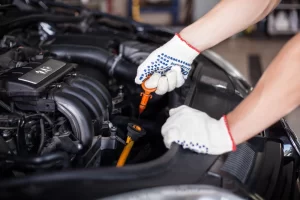Tips For Vehicle Maintenance

Vehicle maintenance is important to keep your vehicle running at optimal levels. Whether you are just purchasing a new vehicle, or you are looking to get the most out of your current ride, there are several tips you can use to make sure your car is performing as it should. These tips include cleaning your motor oil, checking for any damage, and even preventing burnt out headlights and taillights.
Check engine light
The check engine light is a warning sign that there is a problem with your car. It can be a simple maintenance issue or a more serious issue. If you have not had your vehicle checked for some time, it’s a good idea to get it inspected as soon as possible.
When the light is on, you will usually hear a buzzing or grinding sound from the engine. This is caused by a problem with your car’s emissions system. A qualified mechanic can find the cause of your check engine light and repair it.
Tire rotation
Keeping tires in top condition is a crucial part of vehicle maintenance. Not only do well-maintained tires reduce stress on the drivetrain, but also they help improve traction on the road.
Tire rotation is a common vehicle maintenance procedure that should be performed regularly. Rotating your tires can increase the life of your tires, and it also helps to spread the wear evenly between them. The process is relatively cheap and easy, and it can save you hundreds if not thousands of dollars in the long run.
Inspect shocks and struts
Inspecting shocks and struts for vehicle maintenance is important to keep your car safe and reliable. Faulty struts can cause your vehicle to lose control. This can lead to an accident with other drivers, or it can put you and your passengers in danger.
Whether you’re a new or a seasoned driver, it’s important to have your shocks and struts inspected periodically. The shocks and struts in your car can wear out slowly, but you’ll need to have them inspected to determine the condition of your system.
Inspect transfer case fluid
Transfer case fluid is an essential part of your vehicle’s drivetrain. This lubricant keeps gears running smoothly and helps to reduce wear on the parts of your car’s transfer case.
Changing the fluid in your transfer case is relatively easy and can be done by yourself. You’ll need to have some basic tools on hand.
A dipstick will help you check the level of fluid in your transfer case. If the dipstick shows that the transmission fluid is low, then you’ll need to replace the fluid.
Inspect spark plugs
A vehicle maintenance check on spark plugs can reveal a lot about the engine’s performance. Not only can it provide insight into the health of the engine, but it can also help you diagnose and fix problems before they lead to more serious issues.
Spark plugs are important parts of the ignition system and help the engine burn efficiently. However, they will eventually fail. That’s why it’s a good idea to inspect them from time to time. If you don’t know how to check a spark plug, you may want to ask a mechanic or professional for help.
Prevent burnt-out headlights and taillights
Burnt out headlights and taillights can cause a plethora of problems. The problem may not be visible to the driver, but it can cause accidents and traffic stops. This is especially true if you are driving through inclement weather or during night time.
The simplest way to prevent burnt out headlights and taillights is to regularly check and replace your headlight bulbs. Halogen bulbs are typically designed to last for five years. But it is best to have them replaced after three or four.
Check for signs of fogging in your headlight housing. Fogging is caused by moisture that condenses inside the housing. Water can also leak into the electrical outlet, causing a short circuit.
Keeping motor oil clean
Motor oil is critical to the operation of the engine. If you do not keep your vehicle’s motor oil clean, it can build up over time, causing problems with the performance and efficiency of your car.
Your vehicle’s motor oil needs to be checked and changed periodically. In fact, most vehicles have built-in reminders that tell you when you need to change the oil.
Oil is important to your vehicle because it protects many key components. It prevents corrosion and overheating. Keeping your oil clean can also help to improve your fuel economy.
